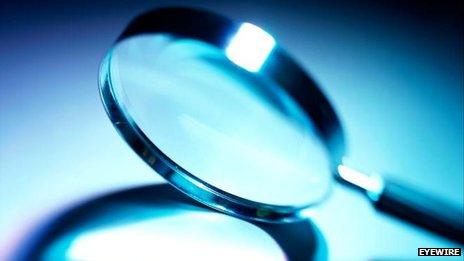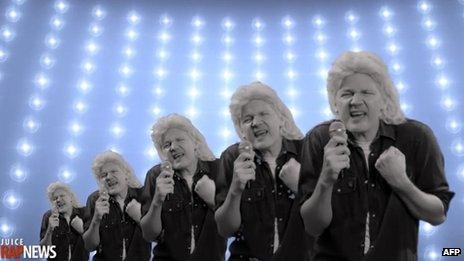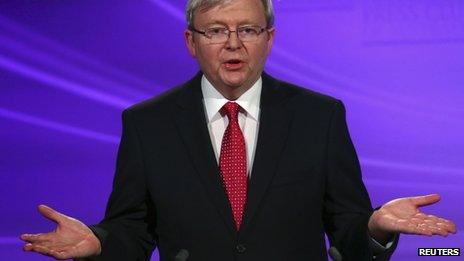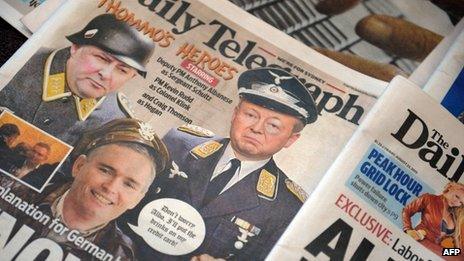Australian election: Ten things
- Published
Australians went to the polls on Saturday to decide the outcome of the race between Labor Prime Minister Kevin Rudd and Liberal-National coalition leader Tony Abbott.
Here are 10 highlights and lesser-known facts about the elections.
1. Longest ballot paper

More than 50 parties were contesting this election - more than double the number in 2010. A record 1,188 candidates are contesting seats, external in the House of Representatives and 529 in the Senate.
Tens of thousands of magnifying glasses were ordered for voting booths in New South Wales, Victoria and Queensland to help voters when they are confronted with a metre-long senate ballot paper.
2. Strangest political parties

There were a number of fringe parties, but a handful stand out because of their unusual names or policies.
Bullet Train for Australia Party is a one-policy party. It wants a high-speed train network and promises to be the least annoying party, external
WikiLeaks Party - formed to support the bid of Julian Assange for a Senate seat in Victoria state. He recorded this campaign video at his bolthole in the Ecuadorean Embassy in London
Pirate Party Australia has nothing to do with swashbuckling and the high seas, but intellectual property, external
Australian Sex Party - the Australian Electoral Commission actually had to decide whether its name was obscene. The civil libertarian party's risque campaign ad went viral
3. Obligatory vote
Every Australian citizen (18 years or older) is required by law to vote. If an enrolled citizen fails to vote and is unable to provide a valid reason, a penalty is imposed.
If the penalty is not paid the matter is taken to court, if found guilty a fine of up to A$170 (£100) plus court costs may be imposed.
Elections are always held on a Saturday because traditionally that is the day most people are not at work or church.
4. Remote polling stations
Even living in one of the most isolated places in the world - Antarctica - is no excuse.
Despite being 5,500km (3,400 miles) away from the nearest official polling booth in Tasmania, more than 50 scientists and support staff based in Antarctic must send their ballots by ship or via a designated polling officer on site who will phone their vote through.
5. Gaffes and blips

Media attention has been somewhat diverted from campaign pledges by a peppering of high-profile gaffes, from suppositories to sex appeal.
Mr Abbott has been the prime offender. During a speech to his supporters in Melbourne, he attacked Prime Minister Kevin Rudd's reputation for making decisions without consulting colleagues.
He said: "No one, however smart, however well-educated, however experienced, is the suppository of all wisdom."
Mr Abbott apparently meant to say "repository", but seemed unperturbed by the titters from the crowd.
He also created a media storm by congratulating one of his candidates on her sex appeal, external. The same candidate, Fiona Scott, later made a gaffe of her own, saying that asylum seekers were contributing to traffic jams, external in western Sydney.
Meanwhile, Mr Rudd was accused of cheating during the first leaders' debate, external because he used notes. The prime minister said he had acted in good faith and that no-one had told him otherwise.
''I prefer to be as accurate as I can,'' he said.
6. Worst interviews
Footage of the TV interview with Stephanie Banister
Perhaps the most toe-curling interview, external of the 2013 election campaign was the Seven News television one-on-one with the 27-year-old ''poster child'' of the anti-immigration One Nation party.
Stephanie Banister thought Islam was a country and that Jews followed Jesus Christ. She withdrew as a candidate shortly after the ill-fated interview.
Described as a "curious" interview by Kevin Rudd, would-be Labor lawmaker Lisa Clutterham withdrew her candidacy after conceding on ABC radio that she had never lived in Melbourne, external - where she wanted to contest a seat - and had been a Labor Party member for less than a month.
The Liberal Party's Jaymes Diaz, meanwhile, boasted his party had a six-point plan to stop boats carrying asylum-seekers, but he couldn't get beyond point one, external - that they will stop the boats.
7. Logistical challenge
Millions of people cast their ballots across Australia on Saturday - a logistical nightmare in a continent-sized country.
The biggest parliamentary constituency is the Western Australian district of Durack, which is roughly three times the size of France. It covers 1.5 million square kilometres (580,000 sq miles).
By contrast, Wentworth in Sydney's eastern suburbs is the country's smallest and most densely populated electorate, covering just 30 sq km.
8. Prisoners' rights
Prisoners serving a full-time prison sentence of less than three years can vote in federal elections, under Australian Electoral Commission rules. But those serving longer sentences are not entitled to take part.
Prisoners are served by mobile polling teams, which visit prisons two weeks before the election date, or by post.
In 2006, while in jail, Vickie Lee Roach fought a High Court case, external that overturned an attempt by the John Howard government to remove the vote from all serving prisoners.
9. Murdoch's media clout

In Australia, Rupert Murdoch dominates the media landscape, external, and he has made no secret of the fact that he wants a change of government.
Two of his daily newspapers, the Courier-Mail and Daily Telegraph, are firmly anti-Kevin Rudd.
The Daily Telegraph ran an unequivocal front page headline: Kick This Mob Out, external. It has also depicted Mr Rudd as Colonel Klink, a bumbling German PoW commandant from the 1960s comedy Hogan's Heroes.
Days before the polls, meanwhile, Australian commercial TV networks refused to broadcast an advertisement that criticised News Corporation, external.
The ad, paid for with funds raised by the activist group GetUp, shows a man using a copy of the Courier-Mail to pick up dog mess.
"Tell Rupert we'll choose our own government," the actor says.
10. Safest seats
Mallee in north-west Victoria is preparing for a genuine election battle. For the first time in 20 years, the Liberals will take on the Nationals. Whatever the outcome, however, it remains the safest coalition seat in federal parliament, with a massive swing required for Labor to win it.
Gellibrand in Victoria is the safest Labor seat in the country, if another party wants to win it, they would need a swing of about 24%.